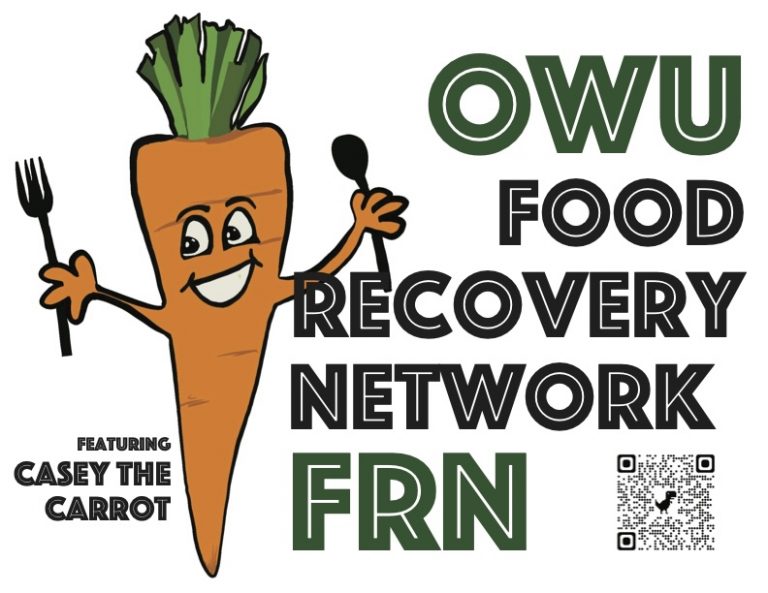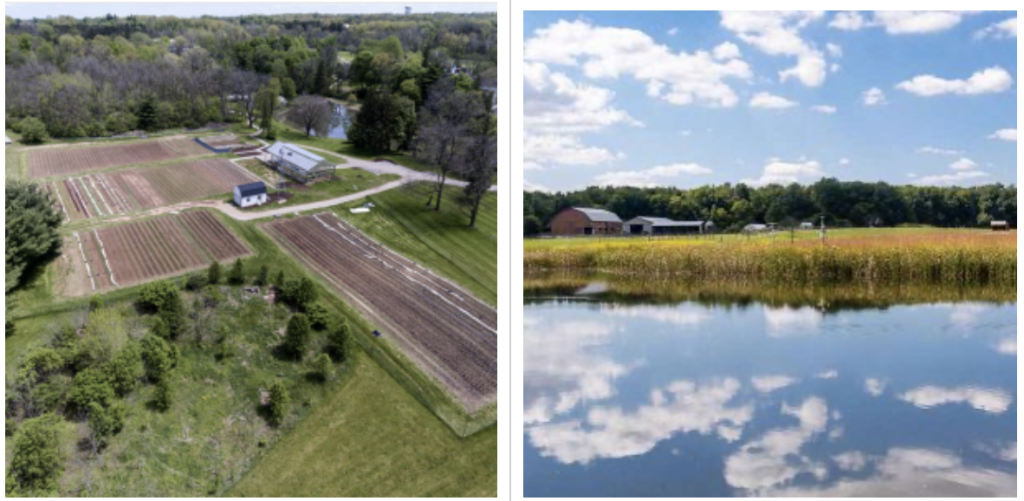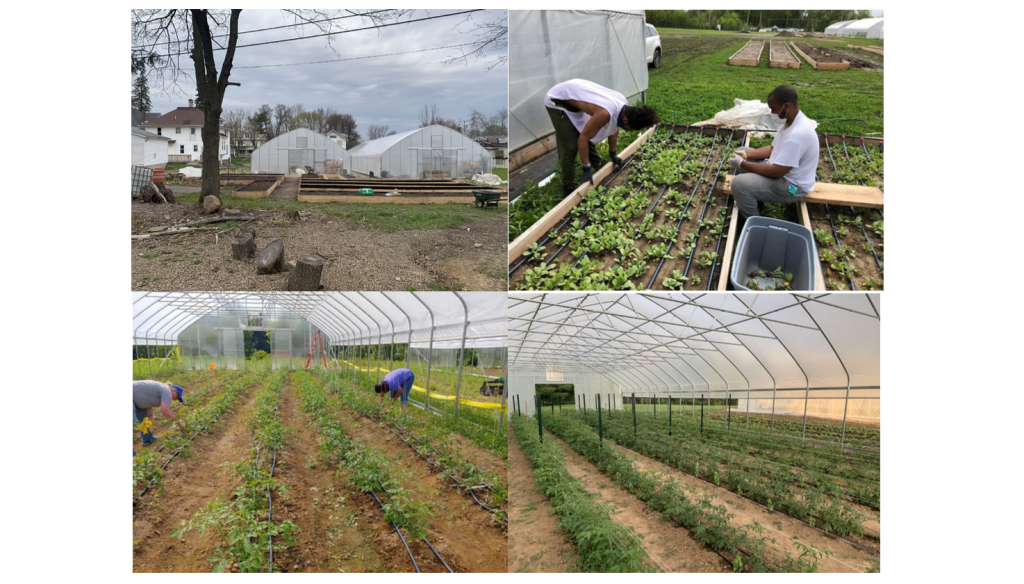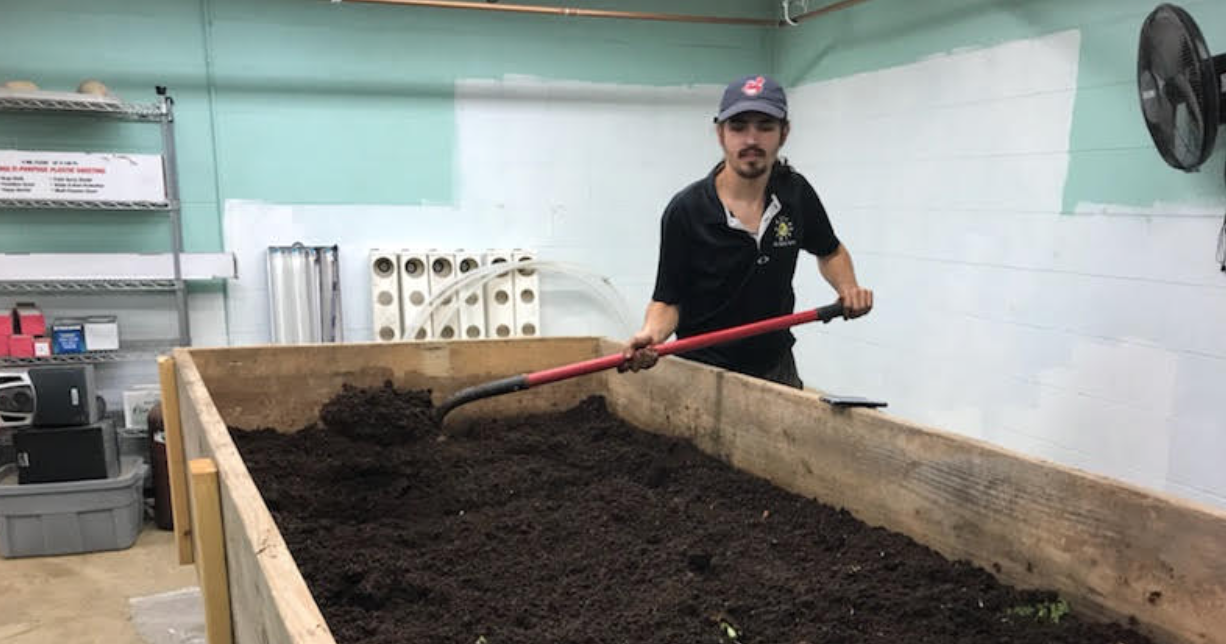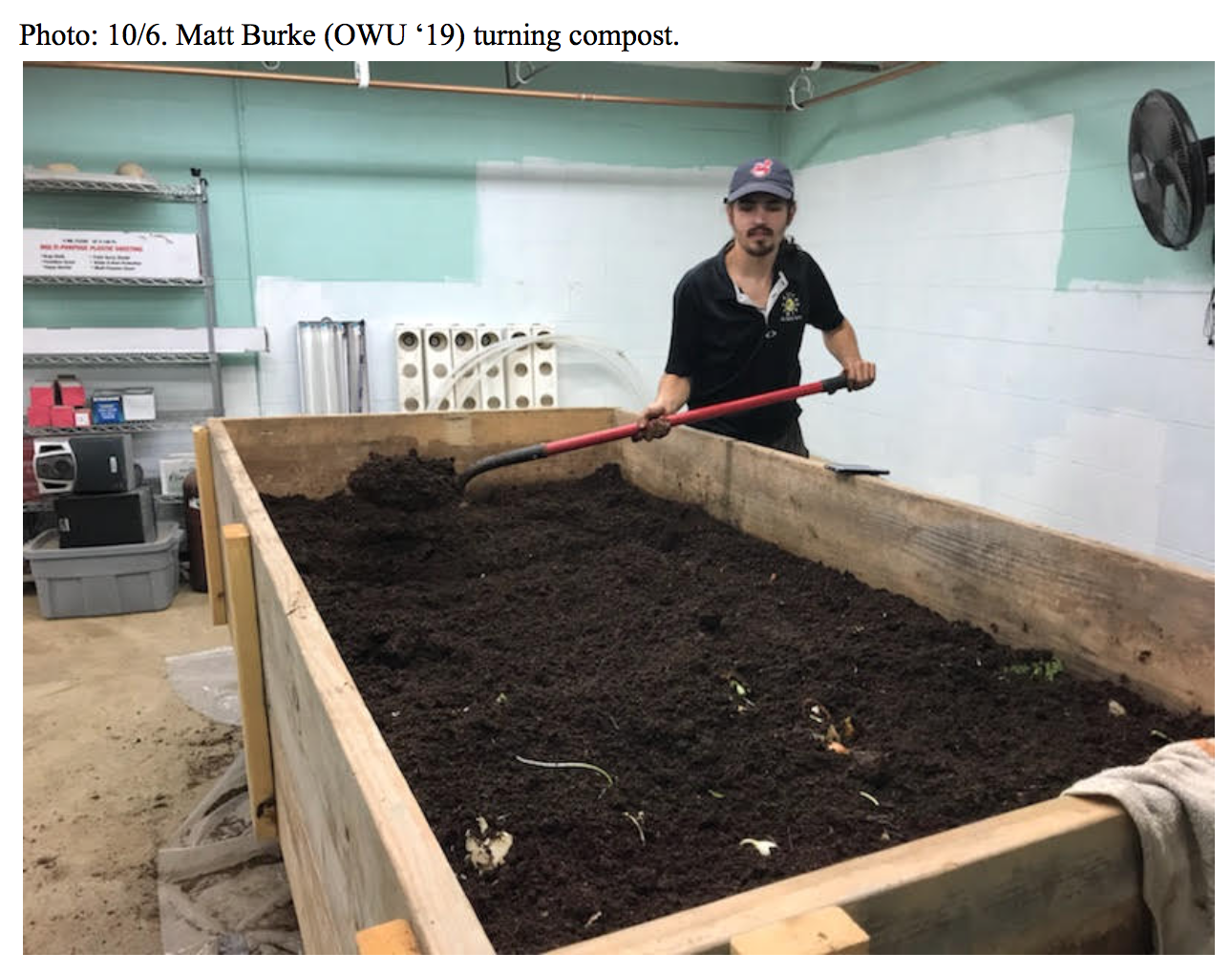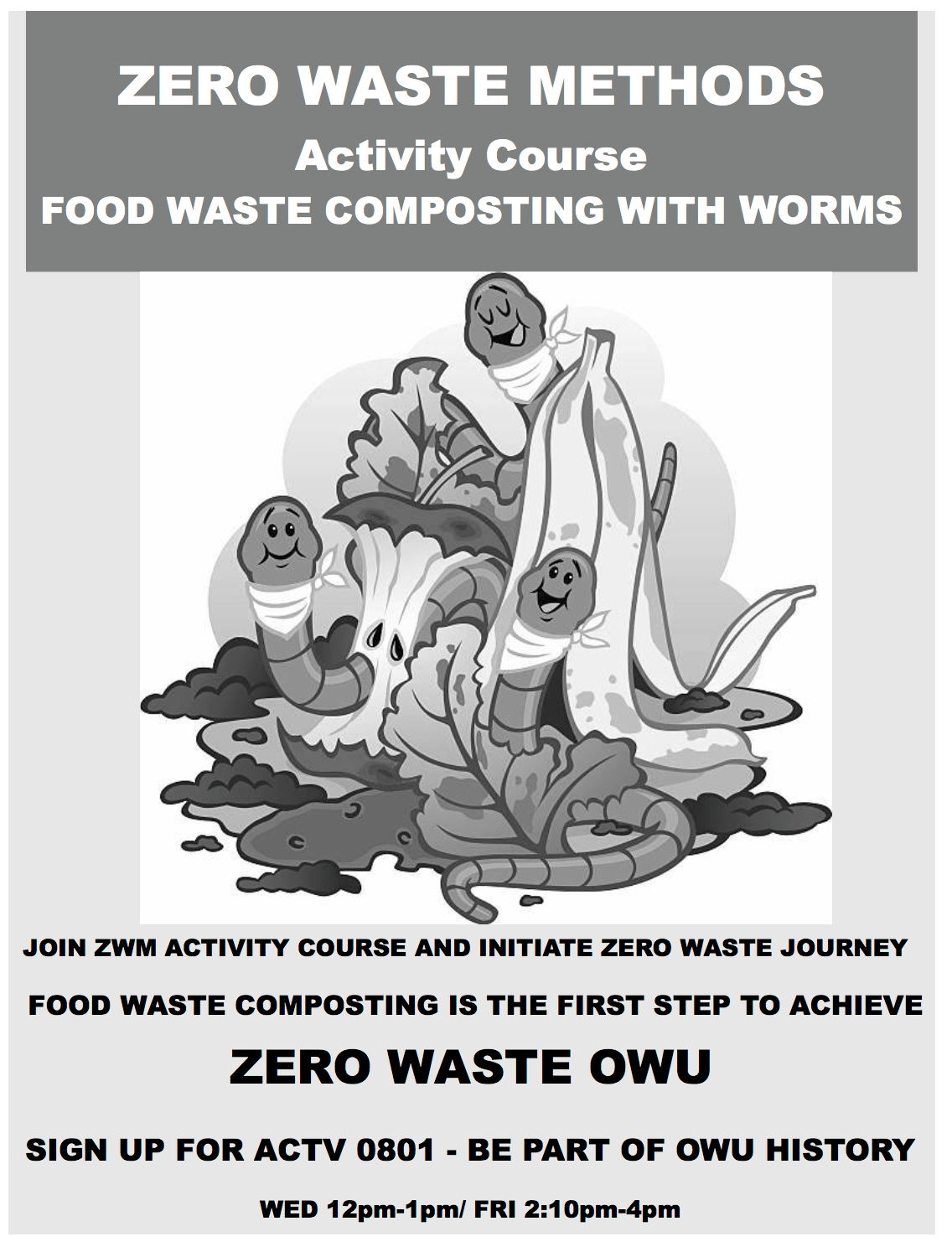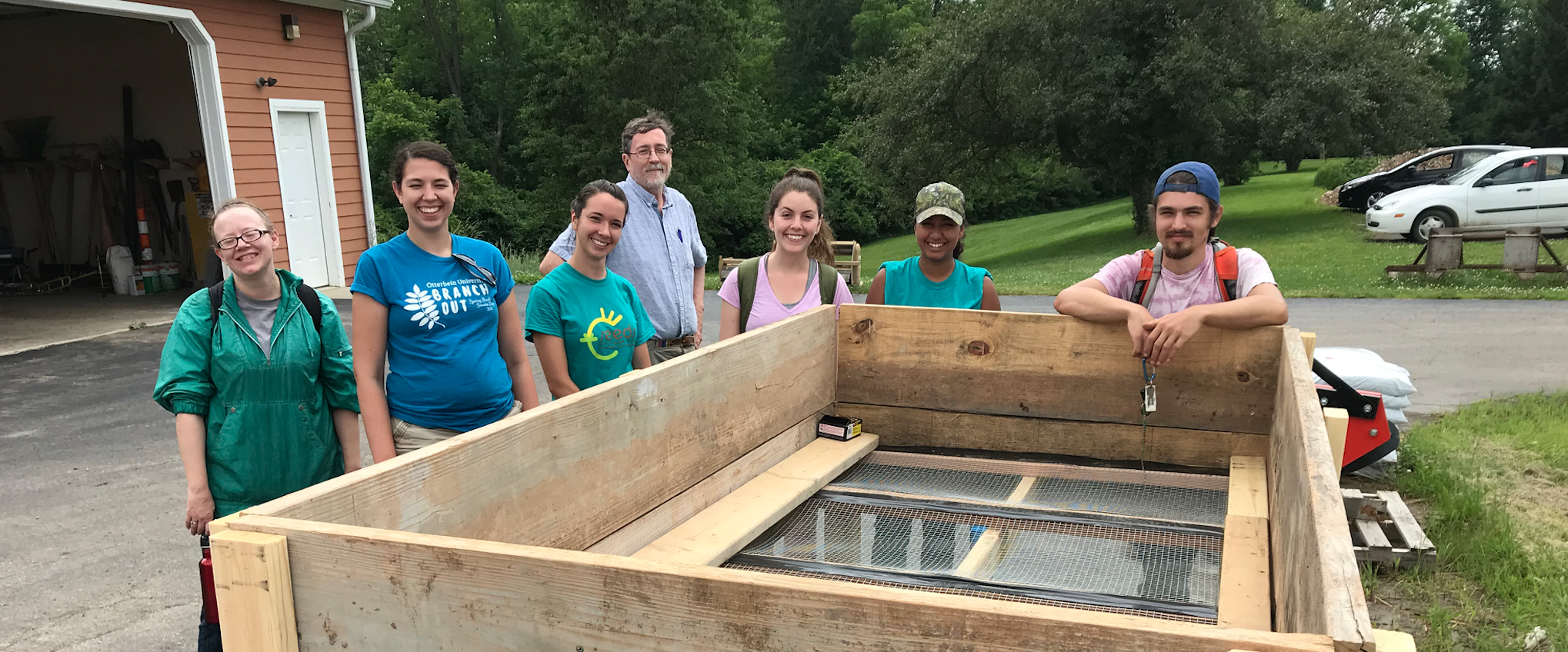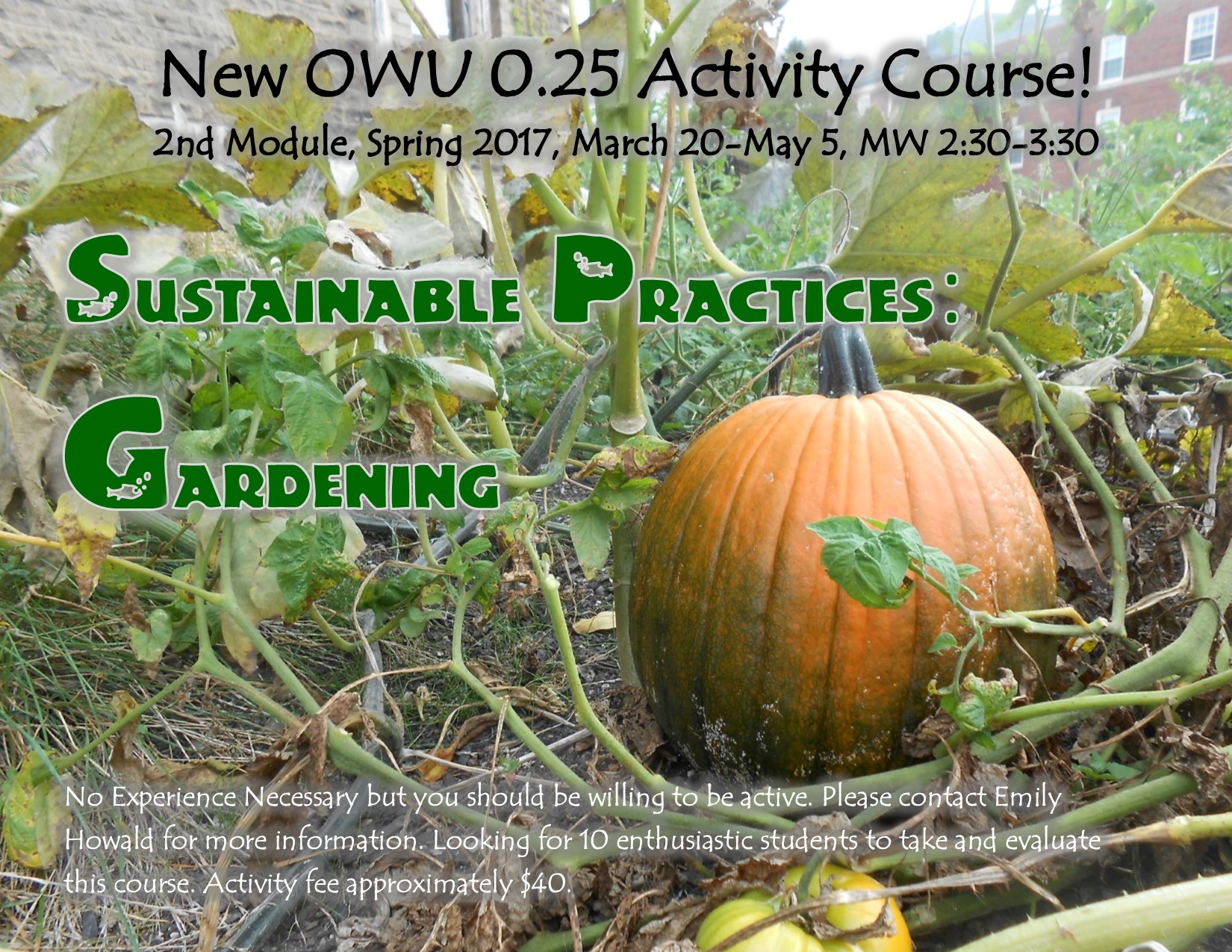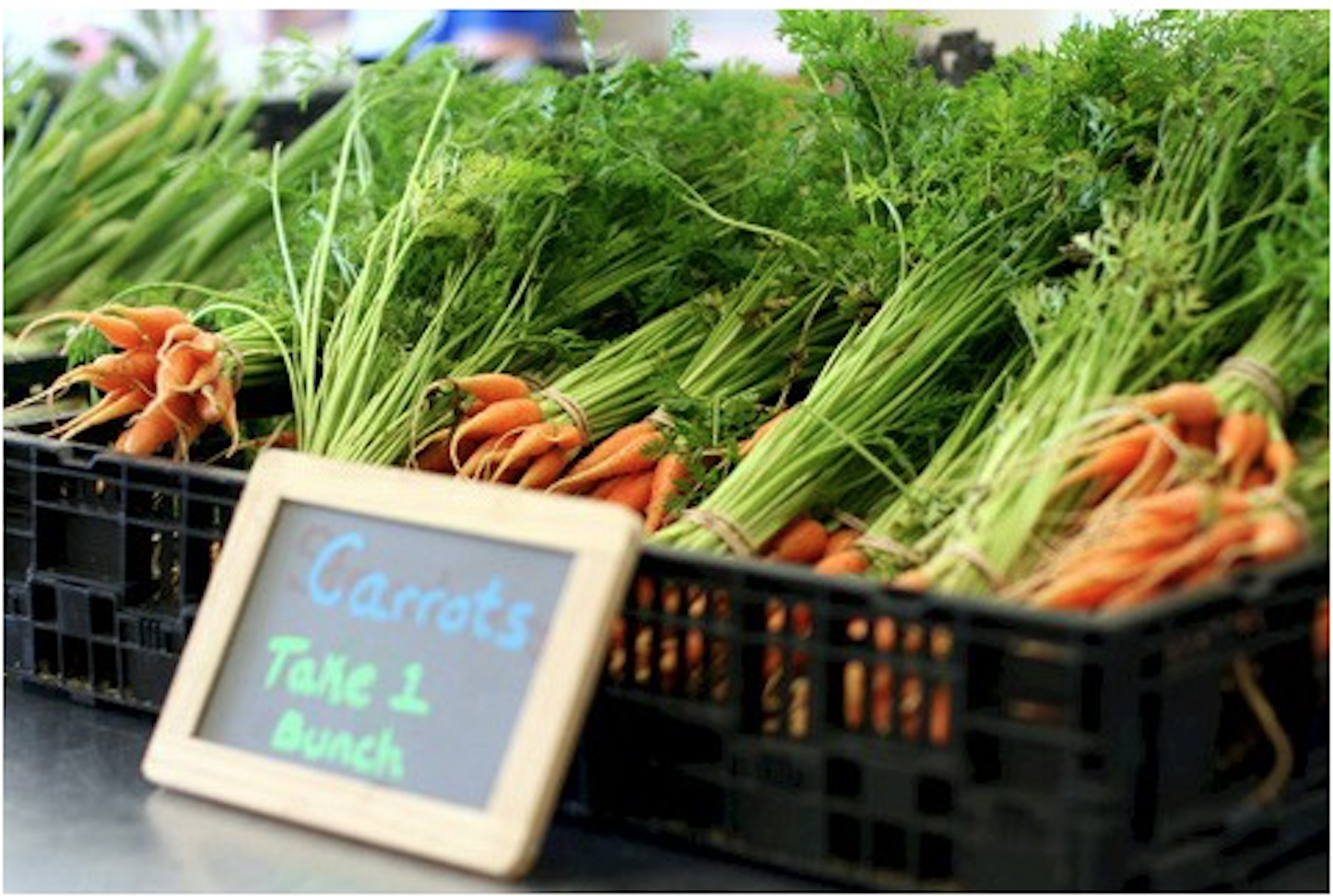OWU has two student-led organizations, affiliated with the Department of Environment and Sustainability. Click on either for more information…
Category: Sustainable Food
Food & Farm & Enviro Education Internships, central Ohio, Summer 2021
Two partner institutions, the Seminary Hill Farm at MTSO and Stratford Ecological Center & Farm are offering summer 2021 internships. Both locations are just south of OWU.
For students interested in sustainable agriculture, environmental education, and science education.
Please apply soon if you are interested: Please share these opportunities with others.
SEMINARY HILL FARM (AT MTSO)
These are full-time, paid internships working at the farm. You can arrange course internship credit through OWU if you wish.
Details on internships here.
Sustainable Agriculture Intern:
Contact Jeff at farmscaper@stratfordecologicalcenter.org
Environmental Education Intern
Contact April at aprilhoy@stratfordecologicalcenter.org
5th Grade Life Sciences Intern:
Contact Katryn at onthetrails@stratfordecologicalcenter.org
Details on internships here.
Event: 3rd Annual Ohio Microfarm Project Symposium
NECIC invites you to the 3rd Annual Ohio Microfarm Project Symposium
October 23, 2020 @ 9am-4:15pm
October 24, 2020 @ 9am-11am
Register Here
(Registration will close on October 22nd at 12pm)
In partnership with The Ohio State University-Mansfield Campus, please join us for an updated overview of the Ohio Microfarm Project.
See the second-year results of this three-year project! The October 23rd event virtually showcases community partnerships, urban farming, resiliency of farming, and co-op development. The October 24th event is brought to you by the Richland Gro-Op and will exhibit two urban microfarm and two rural microfarm outings, all a result of the input received from last year’s symposium.
Schedule: 2020 Ohio Microfarm Project Virtual Symposium October 23, 2020
2020SymposiumScheduleOWU ENVS Earth Day ’20: Cooking for a Healthy World with Chef Del Sroufe
About Chef Del Sroufe
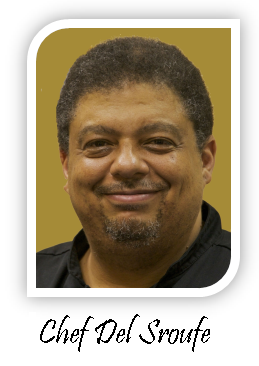 Del’s cooking career began when he was just eight years old; creating dishes from whatever he could find in his father’s kitchen. By age of thirteen he was flaunting his culinary talents by preparing family dinners, much to his mother’s delight. After high school Del shelved his love for the kitchen and sold men’s clothing while he attended The Ohio State University School of Business. Selling suits and ties did not polish Del’s wing tipped shoes so he set out to pursue his passion, cooking. He landed a position at one of Columbus, Ohio’s premier vegetarian restaurants, The King Avenue Coffeehouse, and began to establish himself as a leader in the industry.
Del’s cooking career began when he was just eight years old; creating dishes from whatever he could find in his father’s kitchen. By age of thirteen he was flaunting his culinary talents by preparing family dinners, much to his mother’s delight. After high school Del shelved his love for the kitchen and sold men’s clothing while he attended The Ohio State University School of Business. Selling suits and ties did not polish Del’s wing tipped shoes so he set out to pursue his passion, cooking. He landed a position at one of Columbus, Ohio’s premier vegetarian restaurants, The King Avenue Coffeehouse, and began to establish himself as a leader in the industry.
In 1997 Del opened his own bakery, Del’s Bread, where he created, prepared and served delicious vegan pastries, breads, potpies, calzones, smoothies and other sorted delicacies to the palate of his Columbus based clientele. In 2001, Del transitioned from his bakery business to start a vegan Personal Chef Service, preparing eclectic plant-based cuisine to his already captivated audience. During this time, he developed what became a very popular cooking class series, sharing many of the delicious recipes he had created over the years with his students.
In 2006, Del joined Wellness Forum Foods as Executive Chef, where today he continues the tradition of delivering great tasting plant-based meals to clients locally and throughout the continental United States. Del continues to teach cooking and health classes and is a keynote speaker at local venues and events around the country.
Del is the author of Forks over Knives: the Cookbook, on the New York Bestseller list for more than 30 weeks; Better than Vegan, the story of his struggle with weight loss and gain, and how he managed to lose over 200 pounds on a low fat, plant based diet and; The China Study Quick and Easy Cookbook due to be published in May of 2015.
More: https://chefdelsroufe.com/about-chef-del/
New .25 credit Activity Course on Zero Waste! Spring 2019
It took us more than a year but we now are able to offer an ACTV (Activity Course) with sustainability content. This started as a student initiative.
For the spring of 2018, this course will be offered during the first and second module for .25 credit. Thus the course is a great add-on to your normal class load.
Please sign up for the class, and urge others to do so. We can offer additional topics (organic gardening, repair, etc.) in the future if this one flies.
The instructor is Aleks Ilik: he is an OWU grad and happens to be married to Kristina Bogdanov (Art). Aleks runs the Blue House Worm Farm in town and is currently working with students Matt Burke and Peyton Hardesty on a worm composting table at MTSO. One goal for the course is to expand this effort to OWU’s campus.
Chris Fink of HHK is listed as the instructor, but that is only because Aleks is not yet in the OWU system.
Meetings are scheduled Wednesday, noon-1 and Friday 2:10-4pm. Location TBA.
The Activity course will expand this effort, working with AVI and other folks to reduce waste on campus.
Please let us know if you have any questions!
Spring 2019 Externships and Summer 2019 Internships & Summer Sustainability Practicum
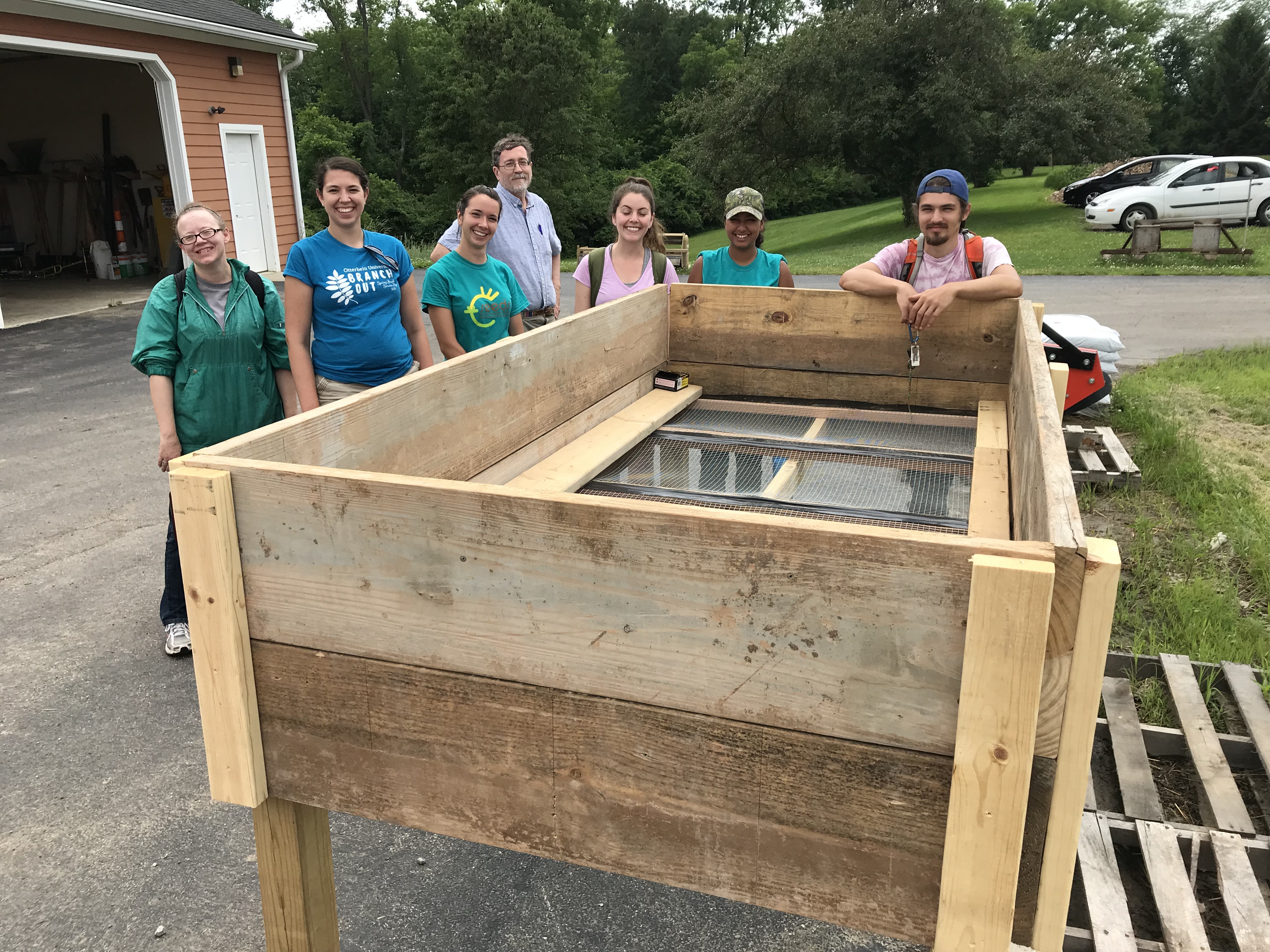
Students: It’s time to act together for Spring 2019 externships and Summer 2019 internships in the OWU region. These opportunities are available to any student, freshmen through senior.
We would like you to take the initiative and contact us if you are interested, as soon as possible, so we can work to line up opportunities for you.
- Externships happen during the semester, typically unpaid and for credit (GEOG 495 or ENVS 495) and are about 8 hours a week.
- Internships happen during the summer, typically paid and can be for credit (GEOG 495 or ENVS 495) and range from part to full time.
We are always adding partners and work to find specific opportunities if we know students are interested.
Please contact Dr. John Krygier (jbkrygier@owu.edu) ASAP if you are interested.
Below find some internship/externship opportunities: This is not a complete list!
Summer Sustainability Seminar & Practicum:
Tentatively scheduled for 3 hours a week for 10 weeks over the summer, meeting (and eating) on MTSO’s campus. This seminar can be taken for credit if you wish. We hope to get many of the area summer interns together, including students from Otterbein and MTSO.
Summer Science Research Program (OWU):
If you are interested in this funded, 10-week research program with OWU faclty (for students between their junior and senior years) please review information about the program here and talk to faculty you are interested in working with. If you are unsure, ask Dr. Krygier or Dr. Anderson. Students may attend the summer Sustainability Seminar and Practicum as part of the SSRP.
Methodist Theological School in Ohio, Seminary Hill Farm:
MTSO is a leader in food and environmental justice and this summer are tentatively offering several full-time internships which come with lodging, a stipend, and some food. Work last summer included the development of a worm composting table, work on pond restoration and assistance on the farm and with the farm’s food justice efforts. A great place to get all hot and sweaty working on a real farm growing real food for a noble purpose.
Delaware Public Utilities and GIS Department:
Typically working with OWU student and Public Utility employee (and all around terrific person) Janelle Valdinger, on various environmental and sustainability efforts. Recent student-involved projects include bio-retention cell planning and construction, utilities tracking and mapping, stormwater drain netting, green-roofed bike racks, composting and
Delaware Watershed and Sustainability Coordinator’s Office: Caroline Cicerchi:
Caroline and Janelle (Public Utilities) work closely together on sustainability, environmental and ecological projects. Caroline, like Janelle, is a masterful project coordinator and terrific to work with.
One of the longest-running relationships with our program is with the Stratford Ecological Center and Farm, just south of campus. OWU typically has 3-5 externships each semester, and several full-time internships each summer. Work is on projects related to the Center farm, its plants, and animals, its nature preserve, as well as environmental education with the many K-8 summer camps offered at Stratford.
Preservation Parks of Delaware County:
With nine parks county-wide and more on the horizon, Preservation Parks is the primary organization developing and maintaining a range of green spaces which also include a working farm. A range of semester externships and summer internships focused on ecological projects, environmental education, outreach and other efforts. If you like to dress up like a 1930s farmer, this is your gig.
One of the largest water companies in the state of Ohio, both semester externships and summer internships are typically available. Projects include water infrastructure mapping, water sampling and analysis, and water education.
If your idea of summer fun is driving large tractors and bulldozers, look no further. Price Farms Organics is a regional leader in composting and typically employes a student or two to help with the practical aspects of large-scale composting.
Innovative Organics Recycling:
A new company run by Ray Leard is currently employing students to help with their drop-off food waste and food scraps composting program.
More possibilities include:
- Central Ohio Communities Project (Terry Hermson)
- Citizens Climate Lobby (Delaware chapter)
- AVI Food Service (OWU Campus)
- OWU Buildings and Grounds (OWU Campus)
- Delaware City Health
- Delaware County GIS Office
- Delaware Parks and Natural Resources
OWU’s New Hyper-Local Salad Bar @ Smith Dining Hall
OWU’s Dining Services in Smith Hall now provides hyper-local produce from MTSO’s Seminary Hill Farm, an organic farm just a few miles south of campus.
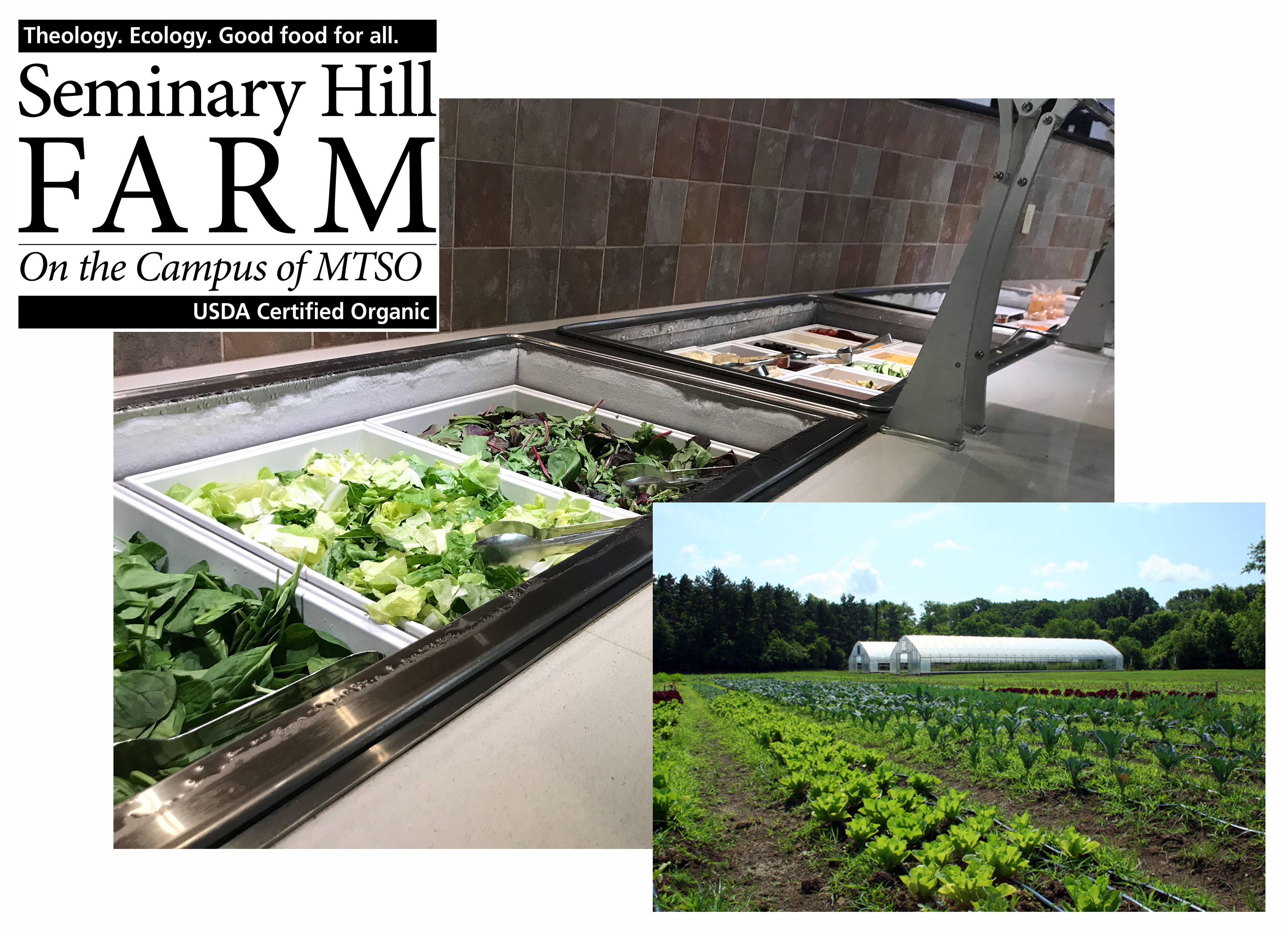
OWU’s Dining Services in Smith Hall now provides hyper-local produce from MTSO’s Seminary Hill Farm, an organic farm just a few miles south of campus. Seminary Hill Farm emphasizes making fresh organic produce available to everyone in the community and works with the Yellow Bird FoodShed to provide fresh produce to members. The farm also teaches students in MTSO’s ministry program to value ecosystems and practice sustainable living.
Seminary Hill produce is now available as part of campus salad bars and will be used in other dishes served by Chartwells during the Fall Semester of 2017. Recipes from Seminary Hill Farm were featured during Farm Fresh Week (September 11th through 15th). Student Ellen Sizer (’18) has been the driving force behind this new culinary addition to campus and describes her motivations and progress:
This project was inspired by the continuous and hard work I have put in to make OWU’s campus more vegan and vegetarian (“veg”) friendly. I have been meeting with representatives for OWU’s food service provider Chartwells on a bi-weekly basis for the last year to discuss ways in which I can turn my ambitions into a reality. Through this collaboration with Chartwells I was able to implement small changes in the menu here at OWU. There are more tofu options, an abundance of soymilk, and tofurky has been added to the rotation in weekly dishes. The proposed Local Food Sourced Salad Bar, to be located in the Smith Dining Hall, is an ambitious next step in accommodating the needs of veg students and promoting local foods. The local Seminary Hill Farm will supply salad and vegetables for the salad bar: this is the foundation for the “local” theme of the salad bar. Much of the food in the salad bar will be vegetarian and vegan. I also envision the proposed salad bar as a location to offer and promote local veg food. However, I do not think only vegetarians and vegans will use the salad bar, and then it is not necessary to advertise the salad bar as vegetarian and vegan. Ultimately, the proposed salad bar will be appetizing and healthy and appealing to all students. In other words, I propose a stealth expansion of local and vegan and vegetarian food on campus through the Local Food Sourced Salad Bar.
I held a discussion/tasting on April 22nd, 2017 with Tadd Peterson and Noelle Deehr from Seminary Hill Farm, as well as Chartwells staff, and Del Sroufe who is co-owner at Wellness Forum Foods. For this tasting, I also invited some students with similar ambitions such as mine to make OWU more vegan and vegetarian friendly. The food was received well and Chartwells was impressed.
Environmental Studies at OWU Update Summer 2017
An update on OWU’s Environmental Studies Program as the summer of 2017 starts.

An update on OWU’s Environmental Studies Program as the summer of 2017 starts.
This is a followup to a 2015-2016 update and 2016-2017 update posted on the OWU Environment & Sustainability Blog.
First of all, the Environmental Studies Program is no longer a thin after our proposal for an expanded Environment and Sustainability Program was voted into existence at the May 2017 faculty meeting. The proposal was compiled by a group of faculty, Laurie Anderson, Ellen Arnold, Amy Downing, Chris Fink, and John Krygier, drawing from 5 years of efforts. Additional work on the Environmental Science major was done by Bart Martin.
Information about the program has been added to the OWU web pages:
- Environment & Sustainability (top page)
- The new Environmental Science Major
- The revised Environmental Studies Major
Our proposed OWU Campus Sustainability Plan created by students, staff and faculty over the last few years is just about in its final form and should be heading to the administration this summer.
Sustainability_Plan_OWU_March_2017Student Emily Howald has spent the year gathering feedback and making adjustments to the plan. The Sustainability Task Force (STF), initiated in 2008, has overseen the development of the plan. Contact Nathan Amador and let him know if you want to be added to the STF mailing list. The STF is open to all.
Student Emily Howald and faculty member John Krygier wrote a paper which is to be published as a chapter in the book Sustainable Communities Design Handbook edited by OWU Alumni Woody Clark (OWU 1967). The book should be published by Elsevier in 2018. The chapter is an overview of OWU’s approach to sustainability, called “Scrappy Sustainability at Ohio Wesleyan University.” Clark was recently presented with an OWU Alumni Distinguish Achievement Award.
The 2017 May Move Out was another success. Students donated tons of items to Goodwill as they moved off campus last month. The event, first held in 2012, is at this point relatively easy to manage and does not cost the University any money (the cost of additional storage pods for donations is offset by the need for fewer trash dumpsters).
Our reusable carryout food container program is also relatively stable after some ups and downs over the last year. We have added drop off locations for the containers, increased their size, and decreased the size of the paper, throw-away containers (thus an incentive to use the reusable containers). Students Izzy Sommerdorf and Sarah Hanes have developed a proposal for making the program even easier for students, and our campus food service, Chartwells, is evaluating their proposal.
Sustainable food on campus has moved forward on several fronts. Our campus food service has recently worked out an agreement to purchase local produce from the Seminary Hill Farm, just south of campus, beginning this fall. This outcome is based on the efforts of student Ellen Sizer.
Student Emily Howald is working on a proposal for quarter-credit OWU Activity courses focused on gardening. Students would work with a skilled gardener in a course held during the first half of the fall semester, and second half of the spring semester, to maintain our campus community garden.
Students Maddie Coalmer and Larynn Cutshaw generated a proposal to plant perennial crops (asparagus, mint, raspberries), which require minimal maintenance, on a few out-of-the-way locations on campus.
Another successful Green Week was held at the end of the 2017 spring semester:
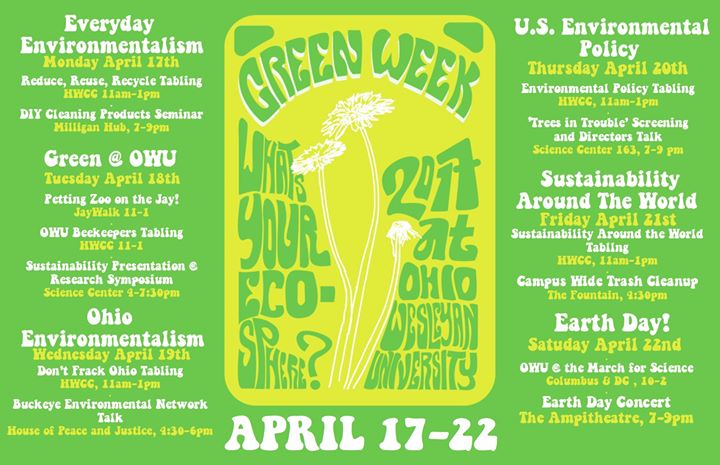
We have expanded the number of hydration stations on campus with a half-dozen new stations being installed this summer. Most of the new hydration stations are in or around athletic facilities on campus. Athletes have tended to be one of the more significant users of bottled water. Student Dominic Orsini wrote a grant and received funding for promotional water bottles. These will be used to promote the new hydration stations to athletes when they move on campus late this summer.
Nathan Amador will take a group of 12 students to Costa Rica as part of a Travel Learning course. This will be the second time the class will travel to Costa Rica. The students will learn environmental data collection and analysis methods, then implement those methods while in Costa Rica over the semester break (January 2018). Amador and the students are working with Amy Work (OWU ’04) and her Geoporter organization. More info on Amy’s efforts are here.
Again, thanks for all the efforts on what has been a great cross-disciplinary collaboration between faculty, students, staff and alumni over the past five years.
Sustainable Gardening: New OWU .25 Credit Activity Course 2nd Module Spring 2017
OWU students and faculty have initiated an effort to offer sustainability themed quarter credit activity courses beginning in the 2nd module for the spring semester of 2017.
This Activity Course has been postponed to the Fall of 2017! Contact Emily Howald for more information.

OWU students and faculty have initiated an effort to offer sustainability themed quarter credit activity courses beginning in the 2nd module for the spring semester of 2017. Instead of yoga or bowling (which are both great) you can instead get active digging in the dirt.

The class is run by staff from the very nearby Seminar Hill Farm, a leading regional organic farm. The class is one part of a strategy to make our campus garden sustainable and productive.
The class meets M and W from 2:30-3:30 in the garden near the old observatory on campus. Please contact Emily Howald for more information. Watch for the course as an option in the near future on Self-Service.
Free Farm to Table Meal @ OWU, Thursday February 16, 2017
Experience a free, farm to table meal using many fresh, locally grown ingredients, Thursday February 16, 2017.
Experience a free, farm to table meal using many fresh, locally grown ingredients.
Join us for a free Cooking Outreach class, hosted by the Student Health Center at Stuy and the OWU Cooking Matters program. Featured talks by folks from our local Seminary Hill Farm.
Time: 7-9 pm
When: Thurs. February 16, 2017
Where: Stuy Kitchen/Milligan Hub
**FREE**
This class is limited to the first 25 responders.
Please RSVP to Olivia Minervino (owminerv@owu.edu) by Feb. 9!
Funding courtesy of an anonymous donor through the Ohio College Health
Association (OCHA)
